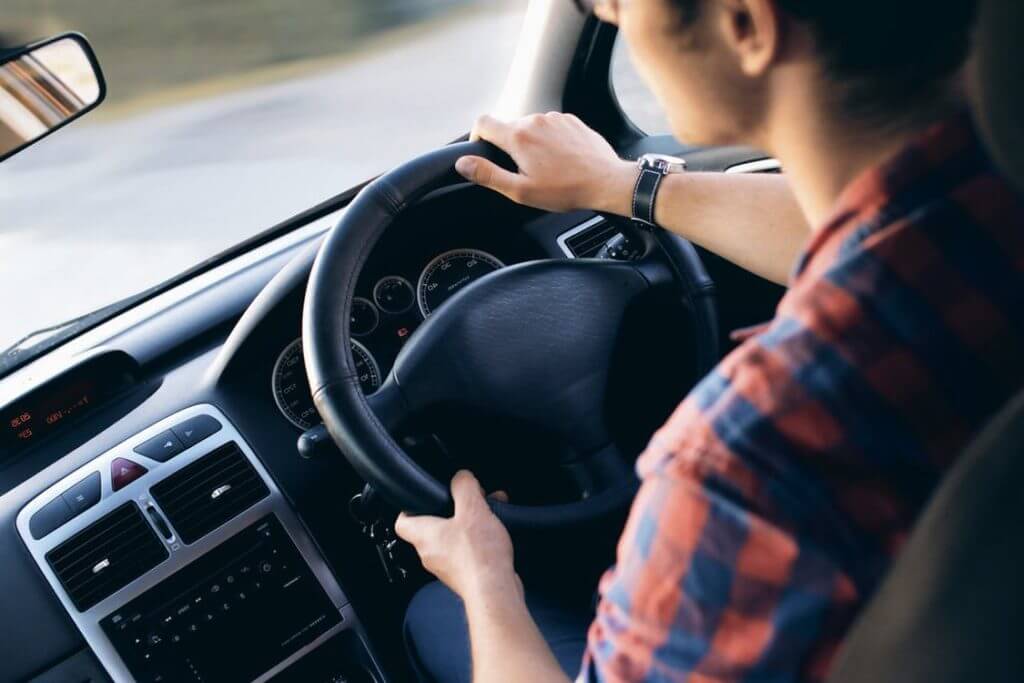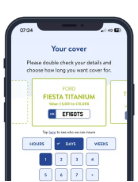Updated on 25 February, 2025.
Before you learn to drive, you may dream of that first journey on your own or taking a road trip. But to become a fully qualified driver, you need to take your theory test.
You won’t be able to get on the road without passing this first stage of the driving test so it’s important to spend some time preparing for it. To make this process a little easier, Tempcover has assembled a guide covering everything you need to know about how to pass the theory test, from what to bring to how long it all takes.
What is the driving theory test?
The theory test is a short test designed to establish that you have a thorough understanding of the Highway Code, which is the official set of rules and guidance for UK road users. Once you’ve got your provisional driving licence, you’ll take the test on a computer inside an official Driver & Vehicle Standards Agency test centre. All the questions you see are set by the DVSA.
It’s the first step in becoming a full UK driving licence holder, the second being to take your practical driving exam. The theory test is split into two parts and you need to pass both before you can book your practical driving test.
The two parts of the theory test
- Multiple-choice
The first part of the theory test is a series of multiple-choice questions. There will be 50 for you to answer in 57 minutes.
- Hazard perception
The second part of the test is designed to check if you can spot the various hazards on the road and respond appropriately. There are 14 video clips with each one specifically designed to test your reactions. This is an essential part of driving safely and you’ll need to demonstrate that you can do it quickly and accurately.
What is the pass mark for the theory test?
The pass mark for the multiple-choice part of the test is 43 out of 50. For the hazard-perception test, the pass mark is 44 out of 75.
You’ll be given your results at the test centre once you’ve completed the test and you must pass both parts to pass.
How old can you be to take the driving theory test?
You can take the theory test at any time from your 17th birthday. If you get or have applied for the higher weekly rate of the mobility part of Personal Independence Payment (PIP), you’re eligible to take the theory test from your 16th birthday.
How long does the test take?
The multiple-choice questions take around 45 minutes to complete. The hazard-perception test takes around 15 minutes in total.
Find out more about how long the theory test takes.
Do I have to take a theory test?
Taking a theory test has been mandatory since 1997. It’s an important step in the driving process. As well as proving that you know the rules of the road and the hazards to be aware of before you get behind the wheel, this helps you when you start taking driving lessons as you can put the theory into practice.
Do I have to pass the theory test before I can have lessons?
You’ll need to pass the theory before you can get your full driving licence. However, you can start lessons while you’re preparing for your theory as long as you have a provisional licence.
Things to do before your theory test
How to practise your theory test so you can pass
Nerves can affect your ability to perform on the day but so can being too confident. The secret to overcoming both is practice and preparation. Familiarising yourself with both the content that you need to know and the format in which you’ll be answering will help you to get ready for the test.
Practice really does make perfect; you can never have too much of it.
- If you’re waiting until after your theory test to book your first driving lesson, try taking a walk and looking out for hazards and common road signs along the way.
- If you’re taking lessons before the theory test, you might find that, as soon as you begin honing your skills on the road, you’ll be able to match the theory you’re learning to real-life experiences.
The sooner and more regularly you do this, the more likely it is you’ll feel confident and ready on the day of your test.
Which books should I read for my driving theory test?
The theory test section of the government website confirms that the multiple-choice questions in the theory test are based on three books:
- The Highway Code
The Highway Code covers all the answers you could need to the theory test questions that may come up. Your knowledge of the Highway Code will define your confidence and safety on the road long into the future.
- Know Your Traffic Signs
Know Your Traffic Signs is a guide for all road users that introduces the various signs and explains what each of them means.
- Driving – The Essential Skills
The Official DVSA Guide to Driving – The Essential Skills is a comprehensive guide with information on every aspect of driving including techniques, weather conditions and safety.
If you want to grow your knowledge even further, there are many books written specifically to help drivers prepare for their theory tests. They’re packed with sample test questions that can help you get that bit closer to passing the exam.
Tips for practising and preparing for the theory test
In order to know how to pass your theory test first time, it’s worth knowing that many people have to put 20 hours of preparation in to pass their theory test. Here are some tips to help you get ready:
- Read and reread The Highway Code
- Put together a study plan
- Set time aside to read your books and practise answering the questions
- Try different mock tests
You don’t have to do it all on your own, either. You could ask a parent or family member to help you prepare, giving you spot tests as you go. Better yet, if you have friends who are taking the test too, why not test each other? Getting asked questions out of the blue will help to sharpen your recall when you’re in an unfamiliar environment. The more times you answer, the easier it will be and the quicker you will get.
Can I do practice tests for the theory test?
There are lots of mock tests online but the best is the DVSA’s own practice test. This will give you the closest thing to real test conditions. There are also many apps that replicate the DVSA theory test, which are really useful to support learning.
Put the theory into practice
The rules in the Highway Code are the rules of the road, so start using the knowledge you gain when you’re in a car – and not necessarily only when you’re driving. Keep an eye out for hazards, decide which lane the car should be in and focus on the road signs while you travel.
Although this kind of practice is ideal for when you’re with your instructor, it’s also perfect training while driving around with your family. Very few test guides can match these conditions as you prepare for your theory test. The more practical the theory becomes in your head, the more your memory will contextualise and recall it. All this will help you prepare for not just your test but also driving in the real world.
Although you can book a theory test before even taking a driving lesson, this is not recommended. The practical experience of driving on public roads will help you understand why the Highway Code exists.
Some learner drivers will prepare for their theory tests without the help of a qualified driving instructor. If you’re one of them, make sure you have learner driver insurance when you practise with a friend or family member.
What does learner driver insurance offer?
Temporary car insurance gives learner drivers a more flexible way of getting comprehensive cover while also protecting any no-claims discounts the vehicle owner has. From 12 hours or one day up to 28 days, Tempcover can help you get behind the wheel with someone other than a qualified driving instructor.
To qualify for learner insurance, you must:
- Be aged 17-69.
- Hold a UK provisional driving licence.
- Have been a permanent UK resident for the last 12 months.
- Not have any licence points or prosecution pending for any motoring convictions.
- Have never been disqualified from driving.
- Have never driven a vehicle that was involved in an accident that was considered your fault, whether partially or fully.
- Have no criminal convictions.
- Not have had a previous policy of insurance declared void by an insurer.
The person supervising you must:
- Be aged over 25.
- Hold a full UK driving licence and have held that licence for at least three years.
- Have been a permanent UK resident for at least two years.
When should I book my theory test?
Part of your theory test prep will involve deciding on a date so that you have something to work towards. Once you have gained plenty of experience on the road and practised your theory questions to a level where you’re likely to pass, it’s time to do your test.
However, getting full marks in practice doesn’t mean you’ve cracked it. Keep a note of the scores you’re getting in the dummy tests as you prepare. If you can see yourself improving, you should be able to work out when you might be ready to take the plunge. Your driving instructor can also offer guidance and advice on when they feel you are all set to take the test.
How to book your theory test
Booking your theory test online is a straightforward process. You’ll need:
- Your provisional driving licence (don’t forget to check it’s valid).
- A valid credit/debit card to pay the £23 for your test (this is the same for cars or motorcycles).
- Your email address or street address, so your booking confirmation can be sent out.
Once you’ve booked your test, you’re one step closer to being a fully qualified driver. If something crops up in the meantime, don’t worry. You can always cancel or change the date of your theory test if you need to.
What if I have a reading difficulty, disability or health condition?
When you book, you will need to say if you have a reading difficulty, disability or health condition. Support will be provided to ensure you can take the test in a way that’s comfortable for you; for instance, if you have reading difficulties, you can ask at the point of booking to hear the test through headphones. If you have a hearing impairment, it’s possible to take the test in British Sign Language.
Should you need to discuss any health condition or disability, you can contact the DVSA who will provide you with guidance.
How do you cancel a theory test?
Sometimes things can crop up that you couldn’t foresee, such as ill health or a family emergency. If that happens, you can cancel your theory test online.
You’ll need your driving licence handy when you do. Simply enter your details and check for mistakes and the system should update automatically. The whole process takes around 10 minutes.
When you’re ready to book it in again, just go online as you did the first time.
If you are upgrading your existing driving licence to allow you to tow a trailer or from an automatic licence to a manual, you don’t need to retake your theory test, so cancel it now and get your money back.
What to do on the day of your theory test
On the day of your theory test, make sure you leave in plenty of time. You don’t want to show up all flustered and worrying about being late. Make some plans well in advance and look at the public transport times or make sure you can source a lift in time.
Try to get a good night’s sleep before the test and don’t stay up until midnight cramming. Have a cut-off time and stick to it. It’s best to go into the theory test with a clear head.
What do you need to bring to your theory test?
- You must bring your provisional licence.
- If you have a licence from Northern Ireland, bring the photocard and paper counterpart licence.
- If you have a paper licence, bring a valid passport as well as your paper licence. If you don’t have a passport, you need to get a photocard licence.
Having your licence with you is really important – if you forget it, or have lost it, you won’t be allowed to take the test. You also won’t be entitled to request a refund.
It’s a good idea to pack everything you need the night before but try not to load yourself up with personal items because you won’t be allowed to take them with you into the test room. You’ll have to keep them in a locker outside until the theory test has finished, so just travel light.
One of the reasons you’re not allowed to take any of these items into the examination room is to stop cheating. It was reported recently that there’s been a rise in learner drivers cheating in recent years and it’s not worth the risk to try – being caught can result in being banned from driving and even a prison sentence.
As soon as you have put away your belongings, you will be taken into the test room and assigned a workstation. This is where you will take your test. There will be a desk and computer and you will be given instructions on how to use the equipment. You’ll then be given some headphones and told to watch an instructional video.
Top tips for passing your theory test
- Revise and prepare then book your test once you feel ready
- Plan your route to the test centre
- Allow time for signing in and accessing lockers if needed
- Stay calm and take your time to answer the questions (but not too long)
- Read the questions carefully and double-check your answers
- Be confident
- Have a guess if you don’t know
The driving theory test process
How to pass the multiple-choice section of the theory test
- Practice: You’ll be given a couple of practice questions to get used to the format and, once you’re happy you understand the process, you can start the test. Nothing will start until you confirm you’re completely ready.
- Answer the multiple-choice questions: Some of these questions will be written in the form of a case study and you’ll be asked five questions about it. Don’t panic if you get stuck. You can flag any of your answers you’re not sure about and come back to them later. With 57 minutes to get through 50 questions, you don’t want to waste any time. You may find coming back with fresh eyes (and after answering other questions) helps the answer come back to you.
- Make it easier: As you work your way through the questions, answer the ones you’re most confident about first. This can give you the best chance of moving through all the questions quickly and accurately – and ultimately passing.
It’s important not to rush but also not dawdle. Trust your research, practice and preparation. Be confident in yourself and your knowledge and be as certain as you can be that you’ve made the right choice before submitting your answers.
Take a break
After the multiple-choice section is over, whether you’ve finished and want to stop or the time limit has been used up, you will be allowed a short break. The break isn’t long – up to three minutes – but it’s enough to gather your thoughts and prepare yourself for the second section without losing momentum.
Try not to think about the section you’ve just finished. Take a deep breath and get ready for hazard perception…
How to pass the hazard perception test
- Watch the video: You’ll be shown a short video that explains how to use the equipment for hazard perception.
- Watch the clips: You’ll then watch 14 clips with each one specifically designed to test your reactions. Each clip contains footage of a normal, everyday driving scenario but there will be a ‘developing hazard’ – something happening that could become dangerous.
In one of the 14 clips, there will be two hazards developing simultaneously. Your task will be to click the mouse when you see the hazard beginning to develop. Points are given based on when you click the mouse and you should only click it if you know how you’d respond.
- Be aware of timings: There are up to five points available for each hazard and it’s important not to wait too long to click. The earlier you detect the hazard, the more points you will score. When you see one developing, click immediately, but not before.
Everything you do needs to be deliberate. Random clicks, repeated clicks or clicking in a pattern will not register as accurate hazard perception on the computer.
The system has been designed to make it impossible to cheat, so don’t try to trick the computer or rely on blind luck. Trust your instincts and your preparation. These are skills you’ll be using every day on the road once you pass.
Find out more about how to pass the hazard perception part of the theory test.
What to do after your theory test
After you finish the hazard perception section, there’s no waiting around for someone to mark your scores. Your results are immediate and you’ll be told right away whether you’ve passed or failed.
What happens after you pass a theory test?
Firstly, congratulations! You can be proud of your achievement and take some time to relax and take everything in. Your examiners will give you a letter confirming you’ve passed, complete with a pass certificate number.
This is an important piece of information. You won’t be able to book your practical test without it.
How long is the theory test valid for after passing?
Although there’s no rush to book your practical test, it’s worth noting your theory test will expire in two years’ time. Check out Tempcover’s guide to what to expect from the practical driving test.
It’s best to keep your driving theory pass certificate number somewhere safe but, if you lose it, you can retrieve this from the government’s website.
What happens if you fail your theory test?
If you fail your theory test, don’t worry. Of course, you’ll be disappointed and you may end up thinking over the questions and decisions you made. Remember you’re not the first person to fail and you certainly won’t be the last. It may be tempting to feel sorry for yourself but you can treat the whole experience as learning and practice for next time. Try not to get too down.
If you fail your theory test when can you retake it?
If you want to get your next theory test booked in straight away, that’s great. You’ll have to wait three working days before retaking it. If you’d rather take some time off and come back refreshed in a week or two after further revision, that’s also valid.
There are no limits on how many times you can take a theory test. Just keep up that practice and revision and, eventually, you’ll get there. Once you have passed, you’re well on your way to hitting the road as a fully qualified driver.
Frequently Asked Questions
What happens if I’m late or miss my test appointment?
You must give at least three full working days’ (Monday to Saturday) notice to change your test. If you change your test within three full working days of the test date, you won’t be able to claim a refund – except in exceptional circumstances (illness or injury that means you can’t take the test, bereavement, unavoidable appointments or having your driving licence stolen). You can find out more about changing your theory test on the UK government website.
How much does a theory test cost?
You’ll need to pay £23 to take your car theory test, roughly a third of the cost of your full practical exam. You can book your theory test and your practical exam online. There are unofficial websites to book but they often charge more so it’s best to stick to gov.uk.
Can I take my theory test at the weekend?
Yes, you can book your theory or driving test for a weekday, weekend or bank holiday. The price is the same on evenings, weekends and bank holidays for your theory test but not for the driving test itself.
Are theory tests the same for different types of vehicles?
No. Each vehicle type has its own testing and pricing system. Most people take the theory test designed for car drivers. If you’re hoping to become a lorry or bus driver instead, you will probably need to take all four of the Driver Certificate of Professional Competence (CPC) tests, although some drivers only need to take two of them.




